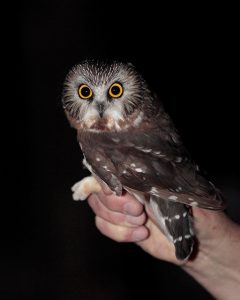Project Owlnet
A Continent-wide Effort to Track Northern Saw-whet Owls
Since 2013, the National Aviary has operated the first Project Owlnet banding station in Western Pennsylvania, one of very few banding stations located near a major urban center. Each spring and fall, National Aviary Ornithologist Bob Mulvihill operates a banding station at Sewickley Heights Borough Park, in partnership with the Borough Of Sewickley Heights and its Manager and Director of Parks and Public Works, Nathan Briggs. Volunteer community scientists assist Mulvihill in banding and tracking the movements of Northern Saw-whet Owls. In its ten years of operation, the station at Sewickley Heights Park has documented more than 250 migrating Northern Saw-whet Owls.
Researchers with Project Owlnet across North America study the movements of the species to understand the timing, pace, and intensity of their migration. Licensed banders delicately catch the birds, which are drawn to a net by a call, band them, collect data, and release them. Bands with unique identifying numbers are placed on the owl’s legs so that researchers in other areas of the continent can track their movements if and when the owl is re-caught. At the Sewickley Heights location, the research team has spotted at least one owl each season that has migrated from different countries. These owls can be traced back to where and when they were banded. In one case, an owl was traced back an astonishing 1,500 miles northwest in southern Alberta, Canada.
Studying Long-eared Owls and Barn Owls
In 2024, we began a collaboration with other owl banders in Allegheny and Washington Counties, including Gigi Gerben from Powerdmill Avian Research Center and the founder of Bird Lab, Nick Liadis. Our coordinated banding efforts aim to enhance our understanding of Saw-whet Owl movements across the Pittsburgh area. Additionally, we launched a pilot program to study the migration of two conservation-sensitive species, the Long-eared Owl and Barn Owl. The National Aviary received a Wild Resources Conservation Program grand for this study which will take place in the fall of 2024 and spring of 2025.
Join Bob Mulvihill for a Project Owlnet Outing!
From dusk until midnight, you’ll routinely check for Northern Saw-whet Owls, Long-eared Owls, and Barred Owls alongside Bob*. In addition to assisting in the setup and take down of banding stations, you will also be able to act as Bob’s data scribe, filling out data forms as he bands and measures each owl. Additional field tasks may also present themselves! At the end of each hour, watch as each newly banded owl flies off to continue its migration path. Given the nature of this work, sightings cannot be guaranteed.
*You may stay as long as you want and come and go from the site as you please!
Spring: Banding takes place every Tuesday and Saturday from March 29 to May 3.
Winter: Banding takes place every Tuesday, Wednesday, and Saturday from October 15 to December 3.
This field research opportunity is offered for all ages, but please note the following path information:
The Walking Path:
- Routine checks involve about a half mile of walking along an uneven trail with peaks and valleys.
What You’ll Need (Recommended):
- Weather-appropriate clothing, such as good walking shoes and extra clothing layers
- Working flashlight and/or headlamp
- Camera
- Refreshments such as coffee/tea or water (note: there are no rest facilities at the park)
- Folding chair if desired
Location:
- Sewickley Heights Borough Park
- Take Hallaway Road to the parking lot; the banding station is located at a picnic table next to the lot.
There is no cost for participation, and registration is not required: Banding takes place from dusk until midnight, and you may stay as long as you like and come and go from the site as you please.
Banding may be canceled due to inclement weather. If you plan to attend, please be sure to check our website for cancellation information.
Email [email protected] or call 412-258-9439 today if you have any questions!

The Northern Saw-whet Owl (Aegolius acadicus) is one of the most common owls found in the forests of southern Canada and the northern United States, but information about this diminutive owl species is sparse. These birds, among the smallest owls in the north, are nocturnal and tend to migrate in irregular patterns, making them difficult to study.
Since the start of Project Owlnet in Pittsburgh, Mulvihill and his team of community scientists have learned a great deal about these secretive birds. Learn more about Project Owlnet’s findings.
More Owl Fun!
Project Owlnet is a free program that is open to the public. If you would like to make a donation to support the National Aviary and important programs like Project Owlnet, please click here.
